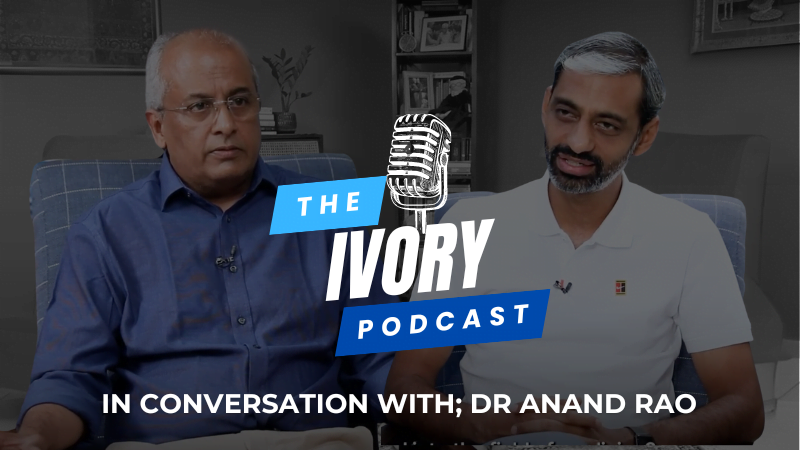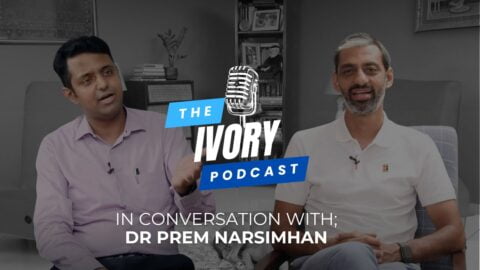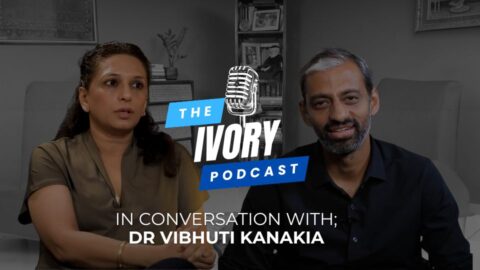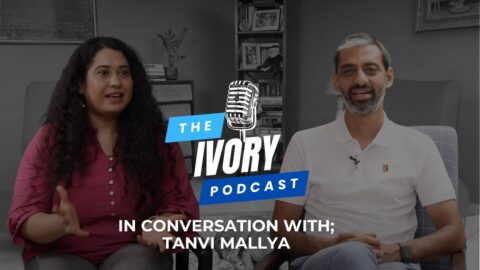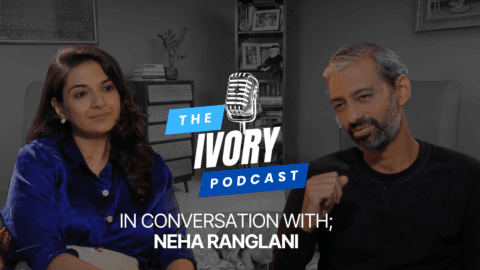First things first, what is the The Ivory Podcast?
“Is ageing gracefully really within our control?”
That’s the question at the heart of The Ivory Podcast. Most health podcasts in India seem to skip over a pretty important group. Yep, we’re talking about the young-at-heart crowd – the ones who’ve celebrated more birthdays than the rest of us.
We bring together a diverse mix of guests, including health coaches, nutritionists, psychologists, doctors, and business professionals. They share insights and truths about the ageing process. It’s not just talk; it’s about understanding what really happens as we grow older. So, join us on the Ivory Podcast. It’s like sitting down for a cup of tea with friends who know a thing or two about growing older gracefully and taking care of our brain health. Keeping this in mind we had a chat with Dr. Anand Rao who is an Interventional Cardiologist.
Here is a little bit of what the Ivory team thinks about him:
Dr Anand Rao was an absolute blast to have on our podcast, he simplifies medicine so easily for us and his energy is almost motivating. One of the best things about the podcast we did with him was his message of hope for anyone who is going to recover from a heart attack or angioplasty. It’s not the end! You can get back up sooner than you know.
Thank you Dr Anand for sharing infinite wisdom and hope to us. We loved chatting with you.
With Gratitude,
Team Ivory
Now here is a little bit of what you should know about his work:
Dr. Anand Rao is a renowned cardiologist with a distinguished career dedicated to advancing heart health. Born into a family deeply rooted in medicine, Dr. Rao’s early exposure to patient care ignited his passion for the field. His journey from witnessing pioneering medical procedures during his medical school days to becoming a leading expert in cardiology is both inspiring and impactful. Today, Dr. Rao combines his extensive knowledge with compassionate care, making significant strides in the prevention and treatment of heart disease.
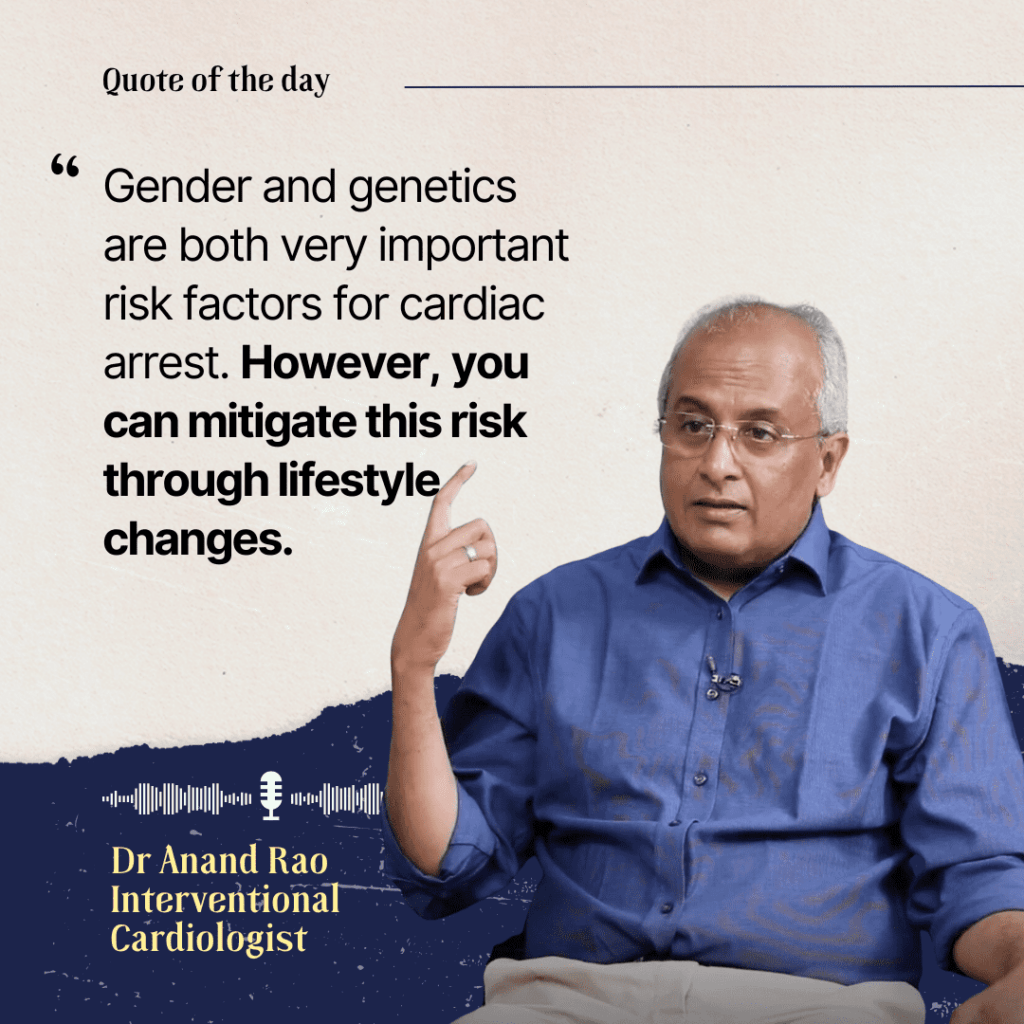
Let’s start 21 questions with Dr Anand Rao:
1. How did Dr. Rao’s journey into medicine begin?
Dr. Rao: I was born into a family where my father was a very popular physician. Growing up, I was always surrounded by medicine and patient care. It felt natural to follow in his footsteps and pursue a career in medicine.
2. What inspired Dr. Rao to specialise in cardiology?
Dr. Rao: During med school, I witnessed an angioplasty procedure and was fascinated by the technology and the ability to treat heart conditions without major surgery. That moment cemented my interest in cardiology.
3. What is the most rewarding part of being a cardiologist?
Dr. Rao: The most rewarding part is being able to save lives and provide cutting-edge care. Seeing patients recover and live healthier lives because of my interventions is incredibly fulfilling.
4. What are the differences between cardiac arrest, myocardial infarction, and a heart attack?
Dr. Rao: Cardiac arrest is when the heart suddenly stops, which can be due to various reasons. Myocardial infarction and heart attack are the same, indicating a blocked artery causing chest pain and potentially leading to cardiac arrest.
5. Why are more young people experiencing heart attacks and cardiac arrests?
Dr. Rao: Increased stress, pollution, unhealthy eating habits, lack of exercise, and smoking are major contributors. These factors, combined with modern sedentary lifestyles, are leading to more heart issues in younger populations.
6. What subtle signs and symptoms should not be ignored regarding heart health?
Dr. Rao: Chest pain, especially during exertion, should always be taken seriously. Other signs include unexplained breathlessness and fatigue, particularly if these symptoms are new or worsening.
7. What immediate steps are taken if someone comes to the ER with a heart attack?
Dr. Rao: We start with an ECG and administer blood thinners. If confirmed as a heart attack, we proceed with primary angioplasty to clear the blockage and place a stent if necessary.
8. What advice does Dr. Rao give for preventing cardiac-related events?
Dr. Rao: Eat less, chew your food properly, and consume a balanced diet with more proteins and fewer carbs and fats. Home-cooked meals are best, and avoid deep-fried and oily foods.
9. How important is exercise for heart health, and what type is recommended?
Dr. Rao: Regular exercise is crucial. Start with brisk walking for 45 minutes daily, and gradually incorporate muscle training. Consistency and a combination of cardio and strength training are key.
10. How can people with existing heart conditions manage their health better?
Dr. Rao: For those with low heart pumping or post-heart attack, start with cardiac physiotherapy and gentle exercise. Gradually increase activity levels under medical supervision to improve heart function and overall fitness.
11. What is angiography, and how does it differ from angioplasty?
Dr. Rao: Angiography is a diagnostic procedure to see blockages in heart arteries using a catheter. Angioplasty is the treatment to open blocked arteries using balloons and stents.
12. What role does stress play in heart health?
Dr. Rao: Stress is a significant factor in heart health. Chronic stress can lead to hypertension and other heart issues. Managing stress through relaxation techniques and lifestyle changes is crucial.
13. How does family history impact one’s risk of heart disease?
Dr. Rao: Family history plays a crucial role in heart disease risk. If you have close relatives with heart disease, you should be more vigilant about your heart health and undergo regular check-ups.
14. What are some common misconceptions about heart disease?
Dr. Rao: A common misconception is that heart disease only affects older people. In reality, it can affect anyone, especially with modern lifestyle factors like stress and poor diet.
15. How important is regular health check-up for heart disease prevention?
Dr. Rao: Regular health check-ups are vital for early detection and prevention of heart disease. Routine tests like ECG, cholesterol levels, and blood pressure monitoring can help catch issues early.
16. What is the importance of hydration for heart health?
Dr. Rao: Staying hydrated is important for heart health as it helps maintain blood volume and pressure. Dehydration can strain the heart and increase the risk of heart-related issues.
17. Can heart disease be reversed through lifestyle changes?
Dr. Rao: While some damage may be irreversible, adopting a healthy lifestyle can significantly improve heart health and prevent further progression of heart disease.
18. What is the significance of sleep for heart health?
Dr. Rao: Adequate sleep is crucial for heart health. Poor sleep can lead to increased blood pressure, inflammation, and a higher risk of heart disease.
19. How do pollutants and environmental factors affect heart health?
Dr. Rao: Pollutants and environmental factors can contribute to heart disease by causing inflammation and oxidative stress, which can damage the cardiovascular system.
20. What advancements in cardiology should patients be aware of?
Dr. Rao: Patients should be aware of advancements like minimally invasive surgeries, better stents, and improved medications that offer more effective and safer treatments for heart disease.
21. What is your final advice for maintaining a healthy heart?
Dr. Rao: Maintain a balanced diet, engage in regular physical activity, avoid smoking and excessive alcohol, manage stress, and have regular health check-ups. Small, consistent changes can have a big impact on heart health.
We’ve summarised this engaging podcast into a Q&A format to highlight the key insights for you. But if you’d like to experience the full conversation, you can listen to the entire episode here.
The Takeaway
In our conversation with Dr. Anand Rao, we’ve delved into the intricacies of heart health, from the subtle warning signs that should never be ignored to the profound impact of lifestyle choices on cardiovascular well-being. Dr. Rao’s insights shed light on the importance of early detection, preventive measures, and the latest advancements in cardiology that are transforming patient outcomes.
His dedication to educating and empowering individuals to take control of their heart health is evident in his thoughtful advice and practical recommendations. As we conclude, it’s clear that small, consistent changes and a proactive approach can make a world of difference in maintaining a healthy heart.
